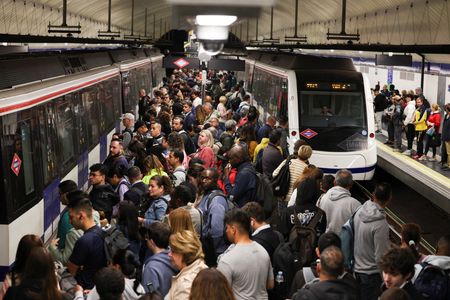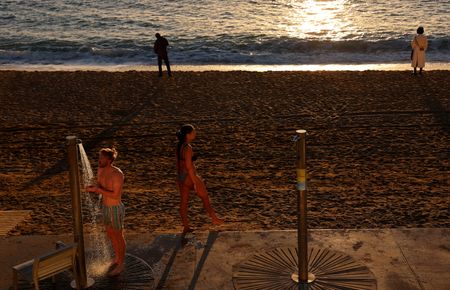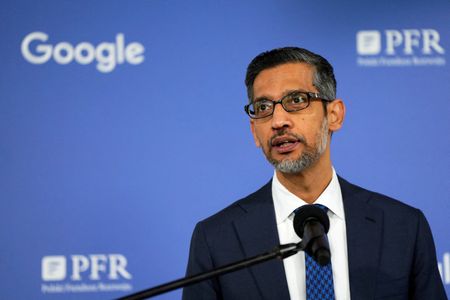MADRID (Reuters) -Spain’s grid operator denied on Wednesday dependence on solar power was to blame for the country’s worst blackout, while Prime Minister Pedro Sanchez came under increasing pressure to explain what went wrong.
With life returning to normal after a power outage that halted trains, shut airports and trapped people in lifts, Sanchez’s opponents pointed the finger at low investment in a system that increasingly relies on intermittent solar and wind power.
Sanchez has announced a government investigation and said he was seeking answers from private energy companies that feed power into the grid. He also said he has not ruled out a cyber attack, although this has been dismissed by part-state-owned grid operator REE.
Spain’s authorities are still dealing with the political fall-out from deadly floods in the east and south of the country that killed more than 220 people.
REE, which is headed by former Socialist minister Beatriz Corredor, has narrowed down the source of the outage to two separate incidents of loss of generation in substations in southwestern Spain, but says it has yet to identify their exact location and that it is too early to explain what caused them.
In an interview with Cadena SER radio, Corredor said on Wednesday it was wrong to blame the outage on Spain’s high share of renewable energy.
“These technologies are already stable and they have systems that allow them to operate as a conventional generation system without any safety issues,” she said, adding she was not considering resigning.
Just before the system crashed, solar energy accounted for 53% of electricity production, wind for almost 11% and nuclear and gas for 15%, according to REE data.
Energy Minister Sara Aagesen said the government had given power companies a deadline of late on Wednesday to provide data for “every millisecond during those five seconds” when the system on Monday lost 15GW of generation, equivalent to 60% of demand, triggering a disconnection from the rest of Europe.
‘MALFUNCTIONING OF REE’
Political opponents said Sanchez was taking too long to explain the blackout, and suggested he was covering up for failings at REE.
“Since REE has ruled out the possibility of a cyber attack, we can only point to the malfunctioning of REE, which has state investment and therefore its leaders are appointed by the government,” Miguel Tellado, a parliamentary spokesperson for the opposition conservative People’s Party, said in an interview on RTVE.
He called for an independent investigation to be conducted by Spain’s parliament rather than the government probe Sanchez has announced.
Spain’s government said it had asked private energy companies for “maximum collaboration and transparency” to help identify the cause of the outage.
Ignacio Sanchez Galan, executive chairman of Spain’s largest energy company Iberdrola, said on Wednesday that the company’s operations were not at fault and it was REE that should clarify the reasons for the blackout.
Antonio Turiel, an energy expert at the state-owned Spanish National Research Council, told Onda Vasca radio station on Tuesday that the fundamental problem was the grid’s instability.
“A lot of renewable energy has been integrated without the responsive stabilisation systems that should have been in place,” he said, adding that vulnerabilities stemmed from “the unplanned and haphazard integration of a host of renewable systems”.
The government expects private and public investment of some 52 billion euros through 2030 to upgrade the power grid so it can handle the surge in demand from data centres and electric vehicles. Aelec, the utility lobby, has said that is not enough.
Jordi Sevilla, REE’s chair until 2020, wrote in an opinion piece in Cinco Dias newspaper that the government was moving too fast to decommission nuclear power plants that can provide stable generation to offset the peaks and troughs of intermittent renewable energy.
The government’s plan for investing in the grid “was planned from an office, with too much renewable messianism and turning a deaf ear to the technical problems associated with such an important change in Spain’s energy mix,” he said.
(Reporting by David Latona, Pietro Lombardi and Aislinn Laing in Madrid; Writing by Charlie Devereux; Editing by Peter Graff and Barbara lewis)









